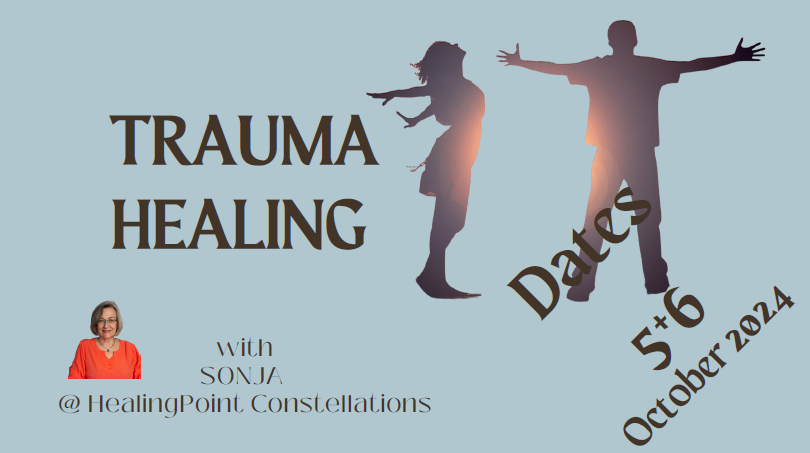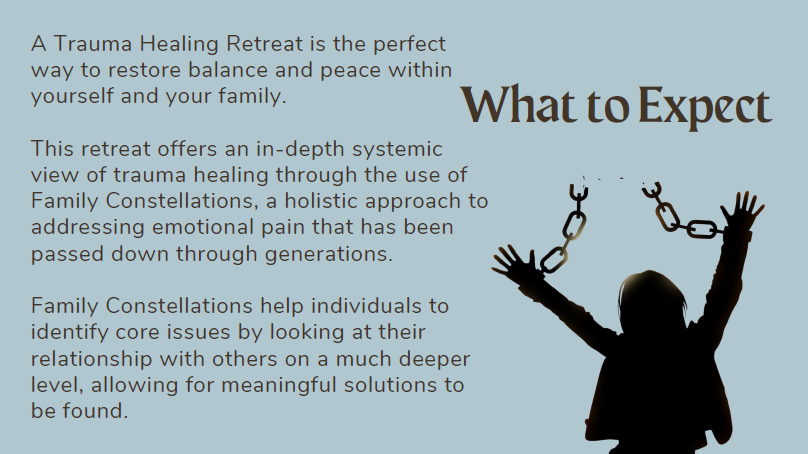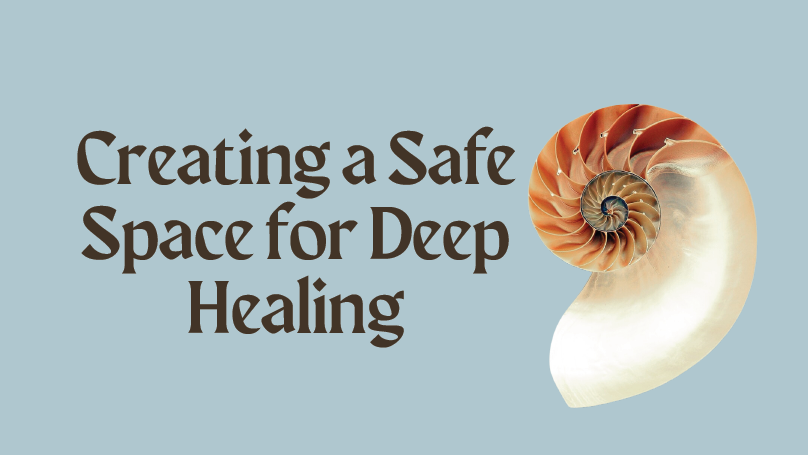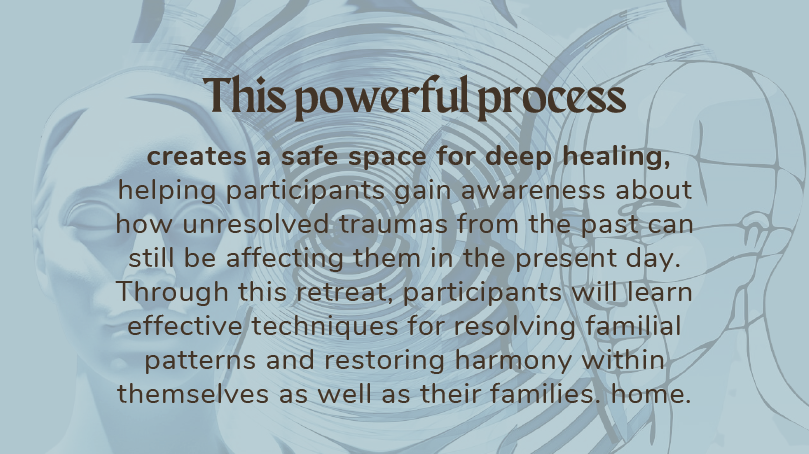Retreats
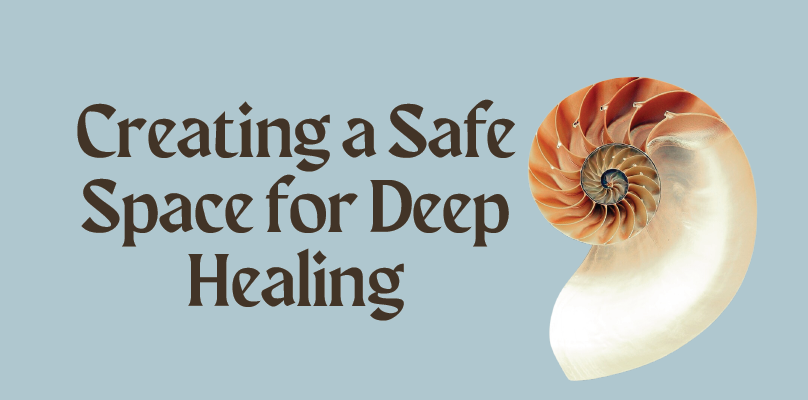
Trauma Healing Retreat 5th & 6th October 2024
Trauma Retreat
Would you be interested in attending an event on the 5th and 6th of October 2024?
Complete and submit the form to the right and I will let you know when the next event is scheduled.
Trauma Healing Retreat
Attending a Two day Trauma Healing Retreat can offer numerous benefits for individuals seeking to address and heal from past traumatic experiences. Here are some reasons why someone might choose to attend such a retreat:
1. Safe and Supportive Environment: Trauma healing retreats provide a safe and supportive space where participants can share their experiences without judgment. The facilitators, such as Sonja and Ronél from HealingPoint Constellations, are trained professionals who create a nurturing environment conducive to healing.
2. Expert Guidance: The facilitators at a trauma healing retreat have specialised knowledge and expertise in trauma therapy. They can guide participants through various therapeutic techniques, exercises, and processes specifically designed to address and heal trauma.
3. Comprehensive Approach: Trauma healing retreats often employ a comprehensive approach to healing that incorporates various modalities and techniques. These may include somatic experiencing, breath-work, mindfulness practices, group discussions, and individual therapy sessions. Such a diverse range of approaches increases the likelihood of finding techniques that resonate with individual participants.
4. Emotional Release: Traumatic experiences can result in suppressed emotions that continue to affect individuals' lives. Retreats offer a supportive space where participants can explore and release these emotions in a healthy and controlled manner. This can lead to a sense of emotional catharsis and increased emotional well-being.
5. Empowerment and Self-Awareness: Trauma healing retreats aim to empower participants by helping them develop a deeper understanding of their traumatic experiences and their impact on their lives. Through guided exercises and therapeutic processes, attendees can gain insight into their patterns, triggers, and coping mechanisms. This increased self-awareness can be instrumental in breaking free from the negative effects of trauma.
6. Connection and Community: Retreats often bring together individuals who have experienced trauma, fostering a sense of connection and community. Sharing experiences with others who have undergone similar struggles can be incredibly validating and comforting. This sense of belonging and support can be an essential part of the healing process.
7. Long-Term Benefits: The effects of trauma can permeate various aspects of one's life, including relationships, self-esteem, and overall well-being. By attending a trauma healing retreat, individuals have an opportunity to address the root causes of their trauma and develop effective coping mechanisms. This can lead to long-term healing, personal growth, and improved overall quality of life.
It's important to note that attending a Two day Trauma Healing Retreat is a personal decision, and the specific benefits may vary for each individual.
1. Safe and Supportive Environment: Trauma healing retreats provide a safe and supportive space where participants can share their experiences without judgment. The facilitators, such as Sonja and Ronél from HealingPoint Constellations, are trained professionals who create a nurturing environment conducive to healing.
2. Expert Guidance: The facilitators at a trauma healing retreat have specialised knowledge and expertise in trauma therapy. They can guide participants through various therapeutic techniques, exercises, and processes specifically designed to address and heal trauma.
3. Comprehensive Approach: Trauma healing retreats often employ a comprehensive approach to healing that incorporates various modalities and techniques. These may include somatic experiencing, breath-work, mindfulness practices, group discussions, and individual therapy sessions. Such a diverse range of approaches increases the likelihood of finding techniques that resonate with individual participants.
4. Emotional Release: Traumatic experiences can result in suppressed emotions that continue to affect individuals' lives. Retreats offer a supportive space where participants can explore and release these emotions in a healthy and controlled manner. This can lead to a sense of emotional catharsis and increased emotional well-being.
5. Empowerment and Self-Awareness: Trauma healing retreats aim to empower participants by helping them develop a deeper understanding of their traumatic experiences and their impact on their lives. Through guided exercises and therapeutic processes, attendees can gain insight into their patterns, triggers, and coping mechanisms. This increased self-awareness can be instrumental in breaking free from the negative effects of trauma.
6. Connection and Community: Retreats often bring together individuals who have experienced trauma, fostering a sense of connection and community. Sharing experiences with others who have undergone similar struggles can be incredibly validating and comforting. This sense of belonging and support can be an essential part of the healing process.
7. Long-Term Benefits: The effects of trauma can permeate various aspects of one's life, including relationships, self-esteem, and overall well-being. By attending a trauma healing retreat, individuals have an opportunity to address the root causes of their trauma and develop effective coping mechanisms. This can lead to long-term healing, personal growth, and improved overall quality of life.
It's important to note that attending a Two day Trauma Healing Retreat is a personal decision, and the specific benefits may vary for each individual.
The ideal person wanting to attend a Three day Trauma Healing Retreat with Sonja and Ronél from HealingPoint Constellations can vary, but generally, it would be someone who has experienced trauma and is seeking healing and support. Here are some characteristics of individuals who might find a trauma healing retreat beneficial:
1. Trauma Survivors: The retreat is primarily designed for individuals who have experienced trauma, such as physical or emotional abuse, neglect, accidents, loss, or other significant distressing events. It can be particularly helpful for those who have tried other therapeutic approaches but are still struggling with the effects of trauma.
2. Individuals Seeking Healing: The ideal attendee would be someone who is actively seeking healing and is committed to doing the necessary work to address their trauma. They are open to exploring their experiences, emotions, and patterns and are willing to engage in therapeutic processes to facilitate healing and growth.
3. Those in Need of Emotional Support: The retreat is suitable for individuals who are in need of emotional support in a safe and nurturing environment. This could include people who feel isolated or unsupported in their healing journey, or those who are looking for a community of like-minded individuals to connect with.
4. Individuals Ready for Self-Exploration: The ideal participant would be someone who is ready and willing to engage in self-exploration. They are open to gaining a deeper understanding of themselves, their trauma-related triggers, and their coping mechanisms. This willingness to explore and reflect allows for greater personal growth and healing.
5. Those Interested in Holistic Approaches: The retreat may be particularly appealing to individuals who are interested in holistic approaches to healing. Sonja and Ronél from HealingPoint Constellations, as facilitators, may incorporate various therapeutic modalities such as constellation work, somatic experiencing, mindfulness practices, and more. Those interested in exploring these modalities and their potential benefits would find the retreat suitable.
6. Individuals Seeking Empowerment: The ideal attendee would be someone looking to regain a sense of personal power and agency in their lives. They want to move beyond the limitations imposed by their traumatic experiences and develop resilience, self-compassion, and empowerment.
It's important to note that trauma healing retreats can be intense and emotionally challenging, so individuals should assess their readiness and capacity to engage in such an experience. Additionally, it's recommended to review the specific details of the retreat, including the facilitators' background, therapeutic approaches used, and the retreat agenda, to ensure it aligns with personal needs and goals.
1. Trauma Survivors: The retreat is primarily designed for individuals who have experienced trauma, such as physical or emotional abuse, neglect, accidents, loss, or other significant distressing events. It can be particularly helpful for those who have tried other therapeutic approaches but are still struggling with the effects of trauma.
2. Individuals Seeking Healing: The ideal attendee would be someone who is actively seeking healing and is committed to doing the necessary work to address their trauma. They are open to exploring their experiences, emotions, and patterns and are willing to engage in therapeutic processes to facilitate healing and growth.
3. Those in Need of Emotional Support: The retreat is suitable for individuals who are in need of emotional support in a safe and nurturing environment. This could include people who feel isolated or unsupported in their healing journey, or those who are looking for a community of like-minded individuals to connect with.
4. Individuals Ready for Self-Exploration: The ideal participant would be someone who is ready and willing to engage in self-exploration. They are open to gaining a deeper understanding of themselves, their trauma-related triggers, and their coping mechanisms. This willingness to explore and reflect allows for greater personal growth and healing.
5. Those Interested in Holistic Approaches: The retreat may be particularly appealing to individuals who are interested in holistic approaches to healing. Sonja and Ronél from HealingPoint Constellations, as facilitators, may incorporate various therapeutic modalities such as constellation work, somatic experiencing, mindfulness practices, and more. Those interested in exploring these modalities and their potential benefits would find the retreat suitable.
6. Individuals Seeking Empowerment: The ideal attendee would be someone looking to regain a sense of personal power and agency in their lives. They want to move beyond the limitations imposed by their traumatic experiences and develop resilience, self-compassion, and empowerment.
It's important to note that trauma healing retreats can be intense and emotionally challenging, so individuals should assess their readiness and capacity to engage in such an experience. Additionally, it's recommended to review the specific details of the retreat, including the facilitators' background, therapeutic approaches used, and the retreat agenda, to ensure it aligns with personal needs and goals.
When attending a Three day Trauma Healing Retreat with Sonja and Ronél from HealingPoint Constellations, participants can expect to engage in family and systemic constellation processes that are specifically designed to address trauma. While individual experiences may vary, here are some common elements and potential outcomes:
1. Safe and Supportive Environment: The retreat will provide a safe and supportive environment where participants can openly share their experiences and emotions. The facilitators will create a non-judgmental space that encourages vulnerability and emotional exploration.
2. Therapeutic Techniques and Modalities: Sonja and Ronél will utilise family and systemic constellation processes to support trauma healing. Added to the constellation work, somatic experiencing, mindfulness practices, guided imagery, expressive arts, breath-work, and more modalities may be included. Participants can expect to be introduced to these techniques and engage in experiential exercises.
3. Emotional Release and Healing: The retreat will offer opportunities for participants to release pent-up emotions and process their trauma in a healthy and controlled manner. Through guided exercises and therapeutic processes, individuals may experience emotional catharsis, gain clarity, and start to heal from the wounds of trauma.
4. Self-Exploration and Insight: Attendees will engage in self-exploration experiences that promote introspection and self-awareness. This may involve exploring personal narratives, identifying patterns and triggers related to trauma, and gaining insight into how trauma has impacted various aspects of their lives.
5. Connection and Community: The retreat will provide a sense of connection and community with other participants who have experienced trauma. Group activities, sharing circles, and supportive discussions create an environment where individuals can feel understood, validated, and supported in their healing journey.
6. Empowerment and Personal Growth: The retreat aims to empower participants by helping them reclaim their personal power and develop resilience. Through family and systemic constellation processes and guidance, individuals can cultivate self-compassion, strengthen coping mechanisms, and foster a sense of empowerment and agency in their lives.
7. Integration and Continued Support: The retreat experience is just the beginning of the healing process. Participants will receive tools, strategies, and resources to continue their healing journey beyond the retreat. Sonja and Ronél may provide recommendations for ongoing coaching, self-care practices, or further workshops to support the integration of the retreat experience into everyday life.
The specific outcomes of attending the retreat will vary for each individual, as healing is a unique and ongoing process. However, potential outcomes may include:- • Increased Emotional Well-being, • Improved Self-esteem, • Decreased symptoms of trauma-related conditions (e.g., anxiety, depression, post-traumatic stress disorder), enhanced coping skills, and • A Greater Sense of Empowerment and Resilience. It's important to remember that healing from trauma takes time and the effects can vary from person to person. The retreat provides a supportive and guided space for initiating the healing journey, but long-term commitment to self-care and continued therapeutic support is crucial for sustained healing and growth.
1. Safe and Supportive Environment: The retreat will provide a safe and supportive environment where participants can openly share their experiences and emotions. The facilitators will create a non-judgmental space that encourages vulnerability and emotional exploration.
2. Therapeutic Techniques and Modalities: Sonja and Ronél will utilise family and systemic constellation processes to support trauma healing. Added to the constellation work, somatic experiencing, mindfulness practices, guided imagery, expressive arts, breath-work, and more modalities may be included. Participants can expect to be introduced to these techniques and engage in experiential exercises.
3. Emotional Release and Healing: The retreat will offer opportunities for participants to release pent-up emotions and process their trauma in a healthy and controlled manner. Through guided exercises and therapeutic processes, individuals may experience emotional catharsis, gain clarity, and start to heal from the wounds of trauma.
4. Self-Exploration and Insight: Attendees will engage in self-exploration experiences that promote introspection and self-awareness. This may involve exploring personal narratives, identifying patterns and triggers related to trauma, and gaining insight into how trauma has impacted various aspects of their lives.
5. Connection and Community: The retreat will provide a sense of connection and community with other participants who have experienced trauma. Group activities, sharing circles, and supportive discussions create an environment where individuals can feel understood, validated, and supported in their healing journey.
6. Empowerment and Personal Growth: The retreat aims to empower participants by helping them reclaim their personal power and develop resilience. Through family and systemic constellation processes and guidance, individuals can cultivate self-compassion, strengthen coping mechanisms, and foster a sense of empowerment and agency in their lives.
7. Integration and Continued Support: The retreat experience is just the beginning of the healing process. Participants will receive tools, strategies, and resources to continue their healing journey beyond the retreat. Sonja and Ronél may provide recommendations for ongoing coaching, self-care practices, or further workshops to support the integration of the retreat experience into everyday life.
The specific outcomes of attending the retreat will vary for each individual, as healing is a unique and ongoing process. However, potential outcomes may include:- • Increased Emotional Well-being, • Improved Self-esteem, • Decreased symptoms of trauma-related conditions (e.g., anxiety, depression, post-traumatic stress disorder), enhanced coping skills, and • A Greater Sense of Empowerment and Resilience. It's important to remember that healing from trauma takes time and the effects can vary from person to person. The retreat provides a supportive and guided space for initiating the healing journey, but long-term commitment to self-care and continued therapeutic support is crucial for sustained healing and growth.
A person wanting to attend a Three day Trauma Healing Retreat with Sonja and Ronél from HealingPoint Constellations can benefit both in the short term and the long term. Here are some potential short-term and long-term benefits of attending such a retreat:
Short-Term Benefits:
1. Emotional Release: Participants can experience a sense of emotional release during the retreat by exploring and expressing suppressed emotions related to their trauma. This can lead to immediate relief and a sense of catharsis.
2. Validation and Support: Being in a community of individuals who have experienced trauma can provide validation, understanding, and support. Sharing experiences with others who can relate to their struggles can be incredibly comforting and reassuring.
3. Increased Self-Awareness: The retreat offers opportunities for self-reflection and introspection. Participants can gain a deeper understanding of themselves, their triggers, and their coping mechanisms related to trauma. This increased self-awareness can lay the foundation for further healing and growth.
4. Tools and Coping Strategies: Retreats often provide participants with practical tools and coping strategies to manage the effects of trauma. These techniques can be immediately applied to daily life, helping individuals regulate their emotions, manage stress, and cope with triggering situations.
5. Relief from Symptoms: Engaging in therapeutic processes during the retreat can provide temporary relief from trauma-related symptoms such as anxiety, depression, hyper-vigilance, or flashbacks. Participants may experience a temporary reduction in the intensity and frequency of these symptoms.
Long-Term Benefits:
1. Healing and Integration: The retreat acts as a catalyst for long-term healing by addressing the root causes of trauma and facilitating a process of integration. Participants may gain insights, develop new perspectives, and establish a foundation for continued healing beyond the retreat.
2. Resilience and Empowerment: By exploring and healing from their trauma, individuals can develop increased resilience and a sense of personal empowerment. They may feel more equipped to face life's challenges, establish healthy boundaries, and make choices aligned with their well-being.
3. Improved Relationships: Healing from trauma can positively impact relationships. Participants may experience improved communication, increased trust, and healthier boundaries in their interactions with others. This can lead to more fulfilling and supportive relationships.
4. Reduced Symptoms and Increased Well-being: Long-term healing can result in a reduction of trauma-related symptoms, such as anxiety or post-traumatic stress. Participants may experience an overall improvement in their emotional well-being, leading to a greater quality of life.
5. Personal Growth and Transformation: Trauma healing is a transformative process that can lead to personal growth and self-actualisation. Individuals may discover new strengths, develop a stronger sense of identity, and cultivate a greater sense of purpose in their lives.
It's important to note that individual experiences and outcomes may vary. The extent of the benefits a person receives from a trauma healing retreat depends on various factors, including the severity of the trauma, individual readiness for healing, and the ongoing commitment to self-care and continued therapeutic support beyond the retreat.
Short-Term Benefits:
1. Emotional Release: Participants can experience a sense of emotional release during the retreat by exploring and expressing suppressed emotions related to their trauma. This can lead to immediate relief and a sense of catharsis.
2. Validation and Support: Being in a community of individuals who have experienced trauma can provide validation, understanding, and support. Sharing experiences with others who can relate to their struggles can be incredibly comforting and reassuring.
3. Increased Self-Awareness: The retreat offers opportunities for self-reflection and introspection. Participants can gain a deeper understanding of themselves, their triggers, and their coping mechanisms related to trauma. This increased self-awareness can lay the foundation for further healing and growth.
4. Tools and Coping Strategies: Retreats often provide participants with practical tools and coping strategies to manage the effects of trauma. These techniques can be immediately applied to daily life, helping individuals regulate their emotions, manage stress, and cope with triggering situations.
5. Relief from Symptoms: Engaging in therapeutic processes during the retreat can provide temporary relief from trauma-related symptoms such as anxiety, depression, hyper-vigilance, or flashbacks. Participants may experience a temporary reduction in the intensity and frequency of these symptoms.
Long-Term Benefits:
1. Healing and Integration: The retreat acts as a catalyst for long-term healing by addressing the root causes of trauma and facilitating a process of integration. Participants may gain insights, develop new perspectives, and establish a foundation for continued healing beyond the retreat.
2. Resilience and Empowerment: By exploring and healing from their trauma, individuals can develop increased resilience and a sense of personal empowerment. They may feel more equipped to face life's challenges, establish healthy boundaries, and make choices aligned with their well-being.
3. Improved Relationships: Healing from trauma can positively impact relationships. Participants may experience improved communication, increased trust, and healthier boundaries in their interactions with others. This can lead to more fulfilling and supportive relationships.
4. Reduced Symptoms and Increased Well-being: Long-term healing can result in a reduction of trauma-related symptoms, such as anxiety or post-traumatic stress. Participants may experience an overall improvement in their emotional well-being, leading to a greater quality of life.
5. Personal Growth and Transformation: Trauma healing is a transformative process that can lead to personal growth and self-actualisation. Individuals may discover new strengths, develop a stronger sense of identity, and cultivate a greater sense of purpose in their lives.
It's important to note that individual experiences and outcomes may vary. The extent of the benefits a person receives from a trauma healing retreat depends on various factors, including the severity of the trauma, individual readiness for healing, and the ongoing commitment to self-care and continued therapeutic support beyond the retreat.

